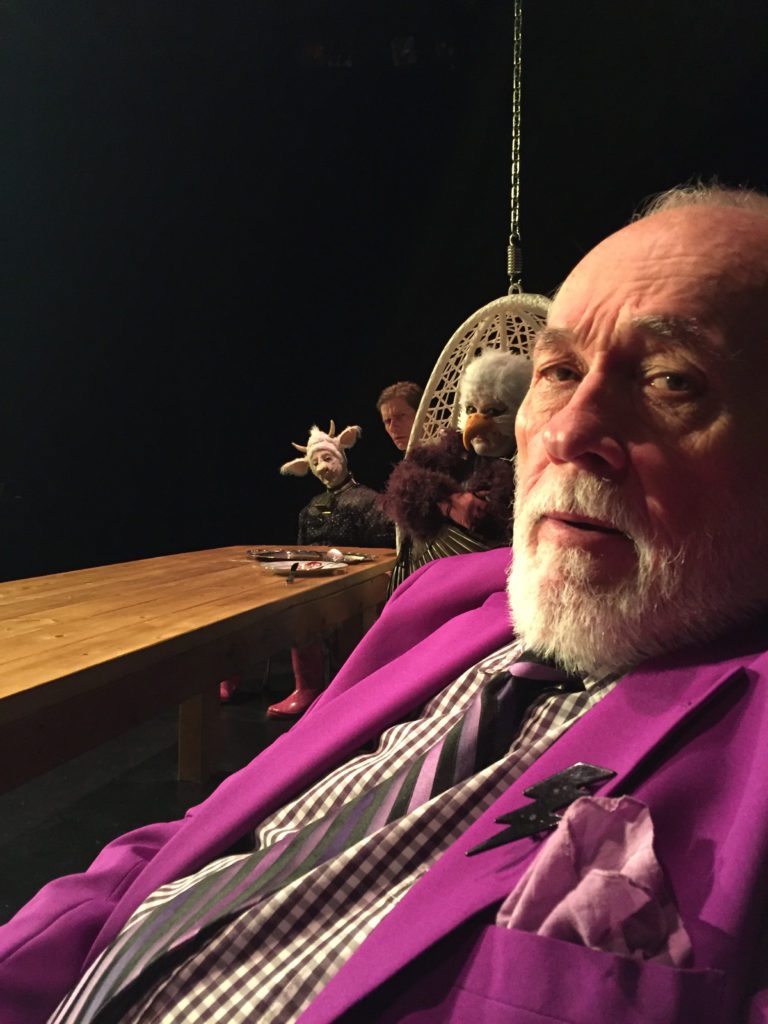Buntport Theater describes their most recent creation, The Zeus Problem, as inspired by Aeschylus’s Prometheus Bound and current events. The story of Prometheus taking fire from the gods and giving it to humans, then being chained to a rock by Zeus, with an eagle eating his perpetually regenerating liver, is well known. But of course, this is Buntport, so they don’t just retell the story. They provide depth to all the characters, add in Henry David Thoreau working on a translation of Aeschylus’s original Greek play, and throw in the arrogant, insecure, angry, cruel, and immature tyrant Zeus, a character noticeably lacking (much to his chagrin) in the original play. While not manifestly tying the situation to the current political climate, the parallels are obvious. This is a thought-provoking and hilarious look at the original myth and at how easily power can be abused.
The play, as always written by the Buntport five, SamAnTha Schmitz, Erin Rollman, Erik Edborg, Hannah Duggan, and Brian Colonna, starts with a prologue by Zeus, beginning his defense for the horrible things he has done. The grand drape then opens, revealing what is later described as a “dinner party” (though only one character is actually eating anything for most of the show) at an immensely long table that also serves as an occasional acting surface. At one end is Thoreau, with his papers stacked in front of him. Zeus, of course, is seated in the center. At the other end is Prometheus, bound to a rock, Io, a woman whom Zeus has turned into a cow, and the eagle charged with pecking out and eating Prometheus’s constantly regenerating liver. The tableau is both absurd and striking, physically establishing relationships immediately. We then learn more about all the characters, with multiple layers of story being told, following what is in the original play and myth, but also providing insightful and often hilarious perspectives.
The acting is superb. Buntport had Jim Hunt in mind when they created the play, and his performance as Zeus is wonderful. He knows he is all-powerful, but he doesn’t understand or care about the suffering he causes – everything is all about him. He is constantly concerned about his appearance, the size of certain body parts, and while he says selfishly that he wants sympathy, his actions are inherently cruel. (Sound familiar?) Erik Edborg is Prometheus, pushing against Zeus, challenging the power structure. Edborg transforms nicely back and forth as he shifts to speaking the translated lines from the play, which are both jarring and surprisingly lovely (though they don’t always rhyme). As Io, Erin Rollman is tender and sympathetic, though somewhat dim (as one would expect from a cow), and intermittently hilarious as she deals with her bovine reality. Hannah Duggan brings the eagle, not a significant character in the story, to life wonderfully, complaining about her lot in life, saying that she “doesn’t even like liver,” and complaining that there are not even any onions. Both Duggan and Rollman capture an astonishing sense of the animals they are, adding bits and ticks that fit perfectly. As Thoreau, Brian Colonna is intelligent, articulate, quoting himself in appropriate ways, transcending the anachronism that brings the multiple time periods together.
Because Buntport does their own designs as they are developing a play, the technical elements are completely integrated with the storytelling. The set is lovely and striking, with a very, very long table, allowing for separation of the characters and giving Zeus a place to puff himself up above everyone else, as well as a bold and sparkling lightning bolt on the wall, never letting anyone forget Zeus’s power. The costumes are exceptional as well, particularly the two animals. It is difficult to describe why they are so good – there is more than suggestion, but they are still not literal, but allow these two talented actors to become the anthropomorphized animals. Prometheus’s t-shirt is humorously appropriate, and Thoreau is clothed appropriately for the period. The sound and lighting are both exceptional as well – the mixing of several different powerful classical music pieces when Zeus becomes angry is artistically and technically perfect.
Buntport has a remarkable ability to take a classic myth, make it interesting, very funny, and surprisingly real, and then give insights in to our lives today. Even with the humor, the pain and suffering is real. It is not just fire that Prometheus gave to humans, it is enlightenment and reason, and Zeus absolutely hates that. This is a battle between humanity and gods. To keep power, Zeus must fight against reason and justice, unwilling to admit to the cruelty of his treatment of Prometheus and Io. For humanity to survive, reason and justice must prevail, which is a very timely message.
Craig Williamson, February 10, 2017, North Denver Tribune
